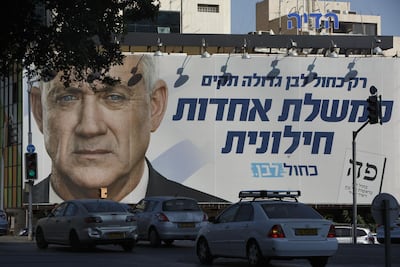Israelis go to the polls on Tuesday in a razor-thin, re-do election that could dramatically reshape Israeli and Palestinian politics going forward.
Will embattled Prime Minister Benjamin Netanyahu pull off another win and then push through legislation to shield himself from looming corruption charges? Or will he be taken down by a hodgepodge of political opponents? Or will the results again be inconclusive and the country, now deeply polarised along internal religious and ideological lines, be asked to vote once again?
For Palestinian citizens of Israel – a fifth of the population – Tuesday’s election is a test of their own political place and power in the country. Mr Netanyahu’s campaign has centred around anti-Arab rhetoric to rally supporters; Arab politicians have in turn urged people to vote in order to oust Mr Netanyahu. But frustrated by racism in Israeli politics and the slow pace of change in Arab parties, many Arab voters say they are likely to sit out the vote.
And for Palestinians living in the occupied West Bank, Mr Netanyahu’s repeated threats to annex parts of the territory – his most recent pledge being to annex a third of it – loom large. But they also worry that no matter who is elected, Israel’s ongoing de-facto annexation of land Palestinians claim will continue.

Adding to the drama, no matter what happens on election day, Israel’s new government and its leader will likely not be set for some time. With no single party expected to reach the required 61 seats to form a government on their own, party leaders will likely spend the next few weeks jockeying over ministerial positions and backdoor deals that in part drive Israel’s coalition-based parliament.
In the meantime, here are the main politicians to watch as the election and its aftermath unfolds:
Benjamin Netanyahu
Mr Netanyahu in July overtook founding father David Ben Gurion as Israel’s longest-serving prime minister. He maintains a strong base of support among right-wing and his Likud party voters, who like his policies and persona of “Mr Security” – the only person who can keep Israel safe.
But others are growing frustrated with the corruption around Mr Netanyahu – he faces indictments on three charges including bribery and breach of trust – as well as the antics and lavish lifestyle of his wife and son, all on taxpayer money. He has further turned off some voters, but gained others, by aligning with ultra-religious and Jewish supremacist parties as part of his game to remain in power.
Mr Netanyahu has in turn cast the accusations against him as a conspiracy led by the media and left, fuelling the country’s polarisation and shift right-ward.
Avigdor Lieberman
It was not long ago that Mr Netanyahu and Avigdor Lieberman were allies; now they are arch enemies and their rift the immediate cause of Israel's re-do elections.
Mr Lieberman, an immigrant from Moldova and former nightclub bouncer, heads the staunchly secular and right-wing Israel Beyteynu (Israel is Our Home) party, which has long been popular among the more than one million Israelis of Russian origin. In April, Mr Lieberman refused to join Mr Netanyahu’s coalition unless the prime minister supported a bill conscripting Ultra-Orthodox Jews into the military. The Ultra-Orthodox parties, a critical part of Mr Netanyahu’s coalition, flatly refused to compromise. Facing an impasse, Mr Netanyahu sided with the Ultra-Orthodox and called for new elections.
Mr Lieberman and Mr Netanyahu still share many similarities: Mr Lieberman lives in an illegal settlement in the West Bank and back in 2009 was the first to capitalise electorally on hate speech against Arabs and Palestinians.
But in this latest election the two men are sparring most directly over how religious the state should be: “Yes to a Jewish state, no to a Halachik (Jewish law) state,” one of Mr Lieberman’s adverts implores. Mr Netanyahu and religious parties have in turn warned that if the prime minister loses, the country will become lost to secular, leftist and Arab leaders.
Benny Gantz
The Labor party was once Israel’s main left of centre party. But as Israel’s politics and demographics have shifted, the centre left has struggled to regain power from Likud. So earlier this year several former army generals and a TV personality joined forces in a new centrist party called Blue and White and led by former army chief of staff Benny Gantz.

In the April elections, Blue and White garnered almost as many votes as Likud. But in this round the party has had a particularly lacklustre campaign, struggling both to define what it believes in besides ousting Mr Netanyahu and to portray political newcomer Mr Gantz as a viable alternative.
While Blue and White has given some Arab voters hope that Mr Netanyahu can be voted out, for others the party led by army generals represents much of the same. After Mr Netanyahu announced his plan to annex the Jordan Valley if re-elected, Blue and White followed up by countering that it was their plan from the start.
Aymen Odeh
There are several scenarios for how Tuesday’s election can play out. In one, Arab parliament member Ayman Odeh could become the leader of the opposition if Likud, possibly without Mr Netanyahu, and Blue and White align and Mr Odeh's Joint Arab List is voted in as the third-largest party.
In a perhaps more likely scenario, if Blue and White does well the Joint List could join Blue and White’s coalition in order to form a government without Likud and Mr Netanyahu.
So far, however, Mr Gantz has ruled out forming a coalition with the Joint List.
And Mr Odeh, who heads the Arab-majority and socialist-leaning Hadash Party, has placed several stipulations on the Joint List joining with Blue and White, among them pledges to cancel the Nation State law, to support a peace plan that ends the occupation, and to create a plan for fighting violence in Arab communities.
Mr Netanyahu has frequently warned of Arab voter fraud aimed at turning the election against him. In the April vote, Likud sent poll watchers armed with cameras to polling stations in Arab communities, which, despite the prime minister’s attempts, has been deemed illegal this time around.
Still, Likud has indicated that they have other voter-intimidation plans set for Arab communities on Tuesday.
For now, Mr Odeh told a recent briefing of the foreign press, his aim is “to do everything to change the government”.
“There’s no doubt that the Arab citizens are a major player in these elections,” he said. “It’s true that he [Mr Netanyahu] incited against Arab citizens but the truth is that he knows that if Arab citizens vote 65 per cent, then he won’t be prime minister anymore.”

